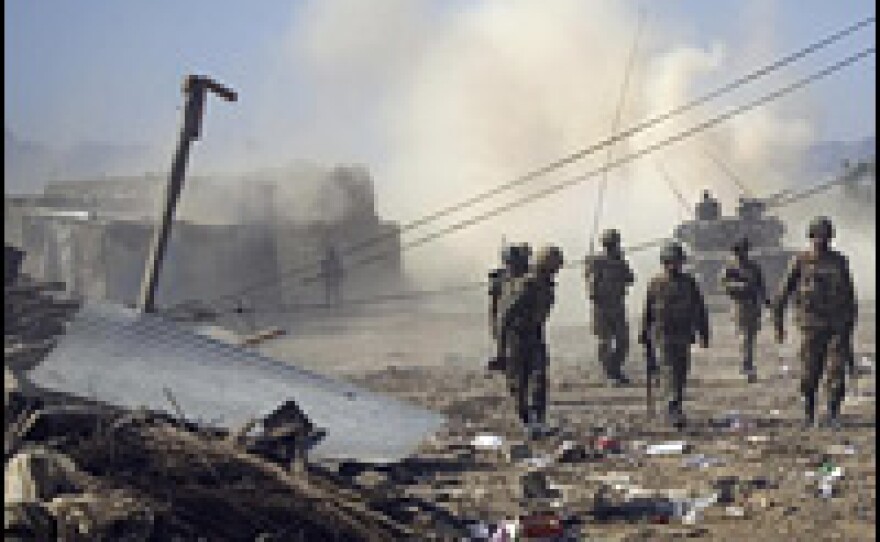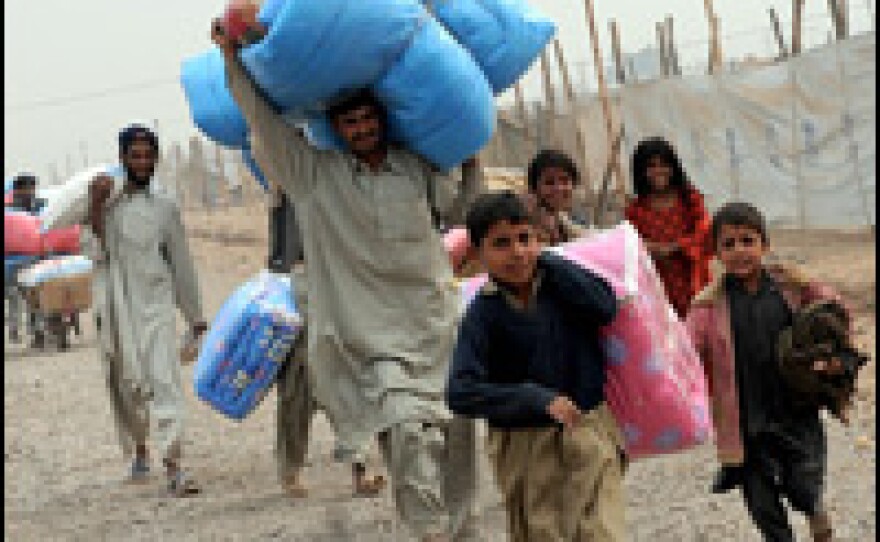
In Pakistan, all eyes are on the country's eastern border with India. There are fears that the two countries may square off militarily in the wake of last month's terrorist attacks in Mumbai.
But the United States is pushing Pakistan's government to keep focused on its western flank, on the border region with Afghanistan. It's there that the Pakistani army has recently been waging an all-out offensive against the Taliban and other Islamist militants. There have been some gains in that operation, but the costs have been high.
The Pentagon says the militants take advantage of the lawless nature of the border region to launch attacks on U.S. and NATO soldiers in Afghanistan. In the past, efforts by Pakistan's military to rout Taliban fighters from the area have been, at best, half-hearted. Now, that has changed.
Escalation In Operations
Three months ago, the Pakistani army began a ferocious assault in the Bajaur region — considered a key transit route for militants moving into Afghanistan. Hasan-Askari Rizvi, a political analyst, says the operation has had an impact.
"This has pushed the militant element, and they have been killed, and for the first time they have realized that the Pakistan military and paramilitary can cause damage to them," he says. "In the past, that wasn't the case."
Pakistan's army has made gains in the Bajaur region. It has had help from the U.S. military directly across the border in Afghanistan — it's providing intelligence and reconnaissance for the offensive.
Rahimullah Yousafzai, a security analyst in the frontier city of Peshawar, says the Pakistani army was forced to escalate its operations in Bajaur.
"I think the army's hand was forced by these Taliban militants because the ... supply lines for troops in Bajaur were cut off. All the border posts in Bajaur on the border with Afghanistan were taken over, were captured by Taliban," he says.
Residents Pushed Out
Yousafzai says the Pakistani army followed the principle of counterinsurgency: Isolate the militants from the rest of the population. But in the case of Bajaur, the army literally pushed out the general public and then began to pulverize the Bajaur area with aerial assaults from gunships and fighter jets.
"Whole villages have been flattened, which I think is a wrong policy," he says. "You know, if they are trying to kill, say, one or two or even 10 Taliban in one village, you don't have to destroy the whole village. ... Everybody has been displaced. And I see some bitterness among these people."
More than 300,000 people have been displaced by the fighting — moving to the major towns and cities and, more often than not, setting up in refugee camps. Yousafzai says there is concern that the Taliban will start recruiting at the overcrowded camps.
Maryam Bibi, head of Khwendo Kor, a large nongovernmental aid and development organization, says the camps are overwhelmed. There's not enough food or water or blankets, and winter is setting in, she says.
Bibi says the problem is so huge that she sometimes loses heart. "I cannot even visit, because when you visit the people, you raise expectations of people."
Bibi says some people have tried to return home but came back to the camps because of the fighting in Bajaur.
"They had left their sheep and the cattle, so they said they would like to see what is happening," she says. "I saw three or four families who went back, and then they came again because ... of this military operation and Talibanization."
Bibi says the problem is that the government hasn't made any plans — it has no long-term strategy for rebuilding the Bajaur region once the fighting is over. That fact is not lost on the people whose homes have been destroyed — their lives disrupted — in the fight to clear the area of the Taliban.
Copyright 2022 NPR. To see more, visit https://www.npr.org. 9(MDAzMjM2NDYzMDEyMzc1Njk5NjAxNzY3OQ001))







